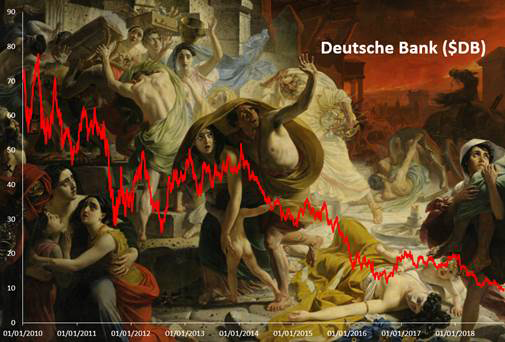“I can definitely say that DB is a safe bank.”
– Stuart Lewis, chief risk officer at Deutsche Bank in August

The Last Day of Pompeii – Karl Brullov
I’d like to believe that all is fine and dandy over at Deutsche Bank.
After all, Deutsche is ranked as one of the top four global systemically important banks by the Bank for International Settlements (BIS) up with JP Morgan, HSBC and Citigroup. If it gets into rough waters, the whole world has a problem.
But it seems the market is in deep disagreement with the chief risk officer’s sunny assurance, and has been for some time. Shares in Deutsche are at 29-year lows, trading at less than half their price when the bank listed on the stock exchange in 1989.
Not long ago, a subscriber wrote in to ask why this bank, with its swollen derivative book and “non-performing loans” (bad debts), was no longer in the news. It was a great question, as the problems hadn’t really gone away. Despite this, the share managed to rally into 2017, before resuming its grand decline – like a party in Pompeii.
But the narrative has now changed, and the problems can no longer be ignored. While in 2017 market participants looked at Deutsche’s problems with optimism, they can no longer do so in 2018. Perhaps Deutsche’s current money laundering scandal would have been overlooked by market participants last year – but not now.
Over at The Fleet Street Letter, my colleague Charlie Morris makes the case that higher interest rates are positive for good banks as lending becomes more profitable. But Deutsche is not a good bank.
Volatility has returned, along with higher interest rates and all the problems that had been shoved into the future by easy monetary policy. Scepticism and fear dwell once again in the hearts of investors. But in their panic, my colleague Eoin Treacy sees opportunity. He thinks the time is ripe to hunt down the weak companies before the panic really sets in, and scalp them for profit on their way down.
He’s running a free webinar on how to do this later in the week – click here to discover his strategy.
With Nick Hubble now writing Southbank Investment Daily, you’ll be hearing more from me at Capital & Conflict. Tomorrow, a former managing director at Deutsche spills the beans on just how devastating the failure of the bank would be – and how such an event would shatter the euro.
Until then,

Boaz Shoshan
Editor, Capital & Conflict
Category: The End of Europe

